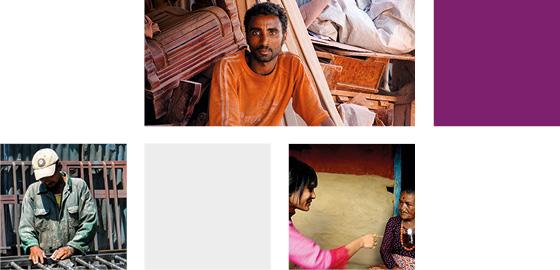Employment in the context of sustainable development

The thematic module Employment focuses on the creation of jobs and income for poor population groups in developing countries within the context of sustainable development.
Portrait
Employment is crucial for the transition from subsistence to industrial society. Employment strategies can be defined as a part of development policies focused on finding favourable combinations of economic resources and human capital for higher productivity. There is a triple challenge:
- Financial resources are scarce, "modern" market rules are only partly established, physical infrastructure and public services are of low quality, etc.
- Human resources are largely unprepared for the transition to modern forms of a market economy; in many developing countries, 80 percent or more of the population live in a subsistence economy, mainly agriculture.
- The transition to gainful employment requires changes in the division of labour between the generations and genders. In such contexts, the adaptation of traditional values, behaviour and social structures to the requirements of better employment and higher productivity are as much a challenge as economic questions of development.
Employment, in this module, is understood as the ability to earn a monetary income and comprises both employment within organisations and self-employment both in the formal and informal economy. Employment refers to gainful occupation only.
Sustainability is understood in its broadest definition, i.e. "development that meets the needs of the present without compromising the ability of future generations to meet their own needs." According to this definition, sustainability has an environmental, economic, social and political dimension. Questions of sustainability in the module concentrate on the interrelations between employment and sustainability in all its dimensions.
Social effects and globalisation are both relevant issues for employment: Growth of the formal labour market can have positive or negative effects on poverty, on the informal economy or on social structures and the environment. While opening national markets and forcing the international division of labour, globalisation is at the same time a risk and an opportunity for the development of national labour markets. The module aims at a better understanding of the societal effects of employment and of the impacts of globalisation on the chances of employment in the context of sustainable development.
The three main research topics of the module are:
- The conditions and dynamics of employment in the context of sustainable development
- The social, economic and environmental effects of employment
- Risks and opportunities of globalisation for employment
Schedule
$(document).ready(function() {
/*
* Simple image gallery. Uses default settings
*/
$('.fancybox').fancybox();
/*
* Different effects
*/
// Change title type, overlay closing speed
$(".fancybox-effects-a").fancybox({
helpers: {
title : {
type : 'outside'
},
overlay : {
speedOut : 0
}
}
});
// Disable opening and closing animations, change title type
$(".fancybox-effects-b").fancybox({
openEffect : 'none',
closeEffect : 'none',
helpers : {
title : {
type : 'over'
}
}
});
// Set custom style, close if clicked, change title type and overlay color
$(".fancybox-effects-c").fancybox({
wrapCSS : 'fancybox-custom',
closeClick : true,
openEffect : 'none',
helpers : {
title : {
type : 'inside'
},
overlay : {
css : {
'background' : 'rgba(64,64,64,0.85)'
}
}
}
});
}); .fancybox-custom .fancybox-skin {
// box-shadow: 0 0 50px #222;
}
body {
max-width: 1356px;
margin: 0 auto;
}Review Panel
- Dr. San Bilal, European Centre for Development Policy Management, Brussels, Belgium (Panel President)
- N.N. (SNSF Delegate)
- Guido Beltrani, Skills and Employment, Swiss Agency for Development and Cooperation, Switzerland (SDC Delegate)
- Dr. Amrita Chhachhi, International Institute of Social Studies, Erasmus University, The Hague, The Netherlands
- Professor em Dr. Kenneth King, University of Edinburg, United Kingdom
- Professor Dr. Santosh Mehrotra, School of Social Sciences, Jawaharlal Nehru University, New Delhi, India
- Dr. Richard Perkins, London School of Economics and Political Science, United Kingdom
- Professor Dr. Clemente Forero Pineda, Universidad de los Andes, Bogotá, Colombia
- Dr. Ibrahim Hathie, Initiative Prospective Agricole et Ruale (IPAR), Dakar, Senegal
Research Network
$(document).ready(function() {
/*
* Simple image gallery. Uses default settings
*/
$('.fancybox').fancybox();
/*
* Different effects
*/
// Change title type, overlay closing speed
$(".fancybox-effects-a").fancybox({
helpers: {
title : {
type : 'outside'
},
overlay : {
speedOut : 0
}
}
});
// Disable opening and closing animations, change title type
$(".fancybox-effects-b").fancybox({
openEffect : 'none',
closeEffect : 'none',
helpers : {
title : {
type : 'over'
}
}
});
// Set custom style, close if clicked, change title type and overlay color
$(".fancybox-effects-c").fancybox({
wrapCSS : 'fancybox-custom',
closeClick : true,
openEffect : 'none',
helpers : {
title : {
type : 'inside'
},
overlay : {
css : {
'background' : 'rgba(64,64,64,0.85)'
}
}
}
});
}); .fancybox-custom .fancybox-skin {
// box-shadow: 0 0 50px #222;
}
body {
max-width: 1356px;
margin: 0 auto;
}The projects in the thematic module Employment started in 2014. They represent transnational research partnerships between 13 countries and Switzerland, involving 17 grantees.
Events
See events page.
News
